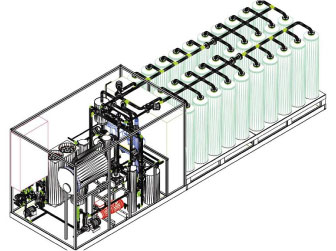Why Regenerated Transformer Oil Is Vital for Reliable Power Systems
The critical function of regenerated transformer oil in guaranteeing the integrity of power systems can not be overstated. By recovering the oil's intrinsic chemical and physical properties, the regrowth procedure dramatically enhances its dielectric stamina and thermal performance.
Relevance of Transformer Oil
Transformer oil plays an important duty in the efficient procedure of electric transformers. This specialized oil offers numerous features, largely as an insulator and coolant, making sure the risk-free and reputable performance of transformer systems. Its dielectric residential or commercial properties avoid electrical discharges, therefore guarding the stability of transformer components. By giving thermal conductivity, transformer oil dissipates warmth generated throughout electrical procedure, which is crucial for keeping optimal operating temperatures and prolonging the life expectancy of the devices.
Moreover, transformer oil functions as an obstacle versus moisture and air, which can result in oxidation and deterioration of transformer materials. The presence of contaminants in the oil can considerably harm its shielding buildings, causing operational ineffectiveness and potential tools failure. Regular monitoring and upkeep of transformer oil are as a result essential to ensuring the proceeded effectiveness of transformers.
The quality and make-up of transformer oil are critical, as they directly affect the reliability and efficiency of the electric systems in which they operate. Comprehending the importance of transformer oil is necessary for energies and sectors reliant on durable power infrastructure, highlighting the demand for effective management and regrowth procedures to preserve oil stability with time.
Advantages of Regeneration Process

Additionally, the regrowth procedure mitigates the destruction of oil, which can lead to increased oxidation and acid formation. This not only boosts the integrity of the oil but additionally reduces the danger of transformer failures due to insulation malfunction. The boosted top quality of regenerated oil allows transformers to run at ideal degrees, inevitably bring about improved power effectiveness and minimized functional expenses.
Additionally, the regeneration process contributes to preserving the total health and wellness of the power system. Transformers can run longer without the need for oil replacement, hence minimizing downtime and maintenance initiatives. In summary, the regeneration procedure supplies considerable advantages by boosting the longevity and efficiency of transformer oil, guaranteeing that power systems run dependably and efficiently gradually.
Ecological Impact and Sustainability
The regrowth procedure of transformer oil substantially alleviates environmental problems connected with oil disposal and waste management. Standard disposal techniques for used transformer oil present substantial threats, consisting of soil contamination and water air pollution. By restoring oil, these threats are substantially minimized, as the process reuses existing resources instead of adding to lose buildup.
In addition, regenerated transformer oil can be recycled in numerous applications, which promotes a round economic climate. This not just decreases the demand for virgin oil extraction-- a procedure that can be ecologically destructive-- yet additionally saves natural deposits. The regeneration procedure itself employs advanced filtration and filtration strategies that eliminate dangerous impurities, ensuring that the last product exceeds or satisfies industry standards for performance and safety and security.

Enhancing Transformer Efficiency
Substantial improvements in transformer performance can be achieved through the usage of regenerated transformer oil. This oil, created with advanced purification processes, substantially boosts the electric insulation residential or commercial properties of transformers. By getting rid of contaminations and contaminants that typically endanger efficiency, regenerated oil ensures exceptional dielectric strength, lowering the risk of electric failures.
Furthermore, regenerated transformer oil displays enhanced thermal conductivity, which assists in efficient heat dissipation. over here This particular is vital for keeping optimal operating temperature levels, therefore prolonging the lifespan of transformers and decreasing the possibility of overheating - Transformer Oil Regeneration Plant. Improved thermal monitoring additionally adds to the total reliability of power systems
Furthermore, the chemical stability of regenerated oil avoids the development of harsh acids and sludge, which can negatively impact transformer parts. By keeping a cleaner interior setting, this oil reduces maintenance needs and expands service intervals.
Cost-Effectiveness and Efficiency
In regards to cost-effectiveness and performance, regrowed transformer oil presents an engaging alternative to traditional oils. The regeneration procedure not just removes pollutants however additionally brings back the oil's initial homes, prolonging its functional lifespan. This durability translates into minimized frequency of oil substitute, therefore lowering operational expenses gradually.
Furthermore, using restored oil can substantially lessen energy losses connected with inefficient shielding liquids. Its exceptional dielectric properties ensure optimum performance, improving the dependability of power systems. As an outcome, companies gain from lower upkeep costs and decreased downtime, fostering a much more efficient operational setting.

Final Thought
In final thought, investigate this site the regeneration of transformer oil plays an essential role in making sure the integrity and effectiveness of power systems. By recovering the important chemical and physical buildings of the oil, this process improves dielectric stamina and thermal conductivity, eventually reducing the try these out risk of insulation breakdown. The ecological advantages linked with reusing resources add to sustainability initiatives, while cost-effectiveness and boosted efficiency emphasize the necessity of using regenerated transformer oil in contemporary electric framework.
Transformer oil plays a vital duty in the efficient procedure of electrical transformers. Routine tracking and upkeep of transformer oil are for that reason important to making certain the continued performance of transformers.
The regrowth process of transformer oil dramatically minimizes ecological problems connected with oil disposal and waste management. By lengthening the lifecycle of transformer oil, the energy and resources normally consumed in producing new oil are considerably lowered.Significant renovations in transformer performance can be attained through the usage of regenerated transformer oil.